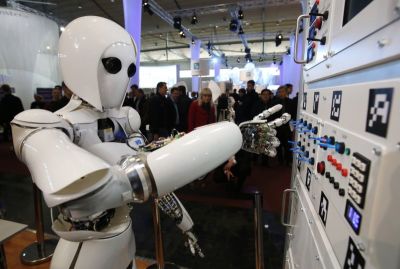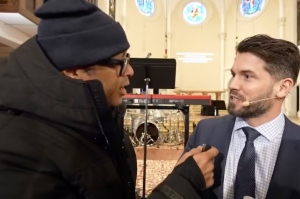The looming spiritual crisis of artificial intelligence (part 1)

(Material for this series taken from Wallace B. Henley: Who Will Rule the Coming ‘gods?’ (Vide, 2021).
American military use of artificial intelligence will be more ethical than that of other nations because the United States is a “Judeo-Christian society.”
That opinion was voiced recently by U.S. Air Force General Richard G. More. The three-star officer believes that because of the broad scope of religious belief and expression in the United States, there will be a more principled approach to the use of AI by the military.
Great was the outcry from secularists and others. However, the General’s opinion must be carefully thought through, especially in light of a statement made several years ago by a powerful civilian.
Referring to AI, former Google engineer Anthony Lewandowski said that “What is going to be created will effectively be a god … If there is something a billion times smarter than the smartest human, what else are you going to call it?”
Lewandowski expressed that view as he announced the formation of the First Church of Artificial Intelligence.” Nevertheless, both men’s thoughts reveal how quickly consideration of AI and its rapid development quickly can take on religious implications.
Lewandowski’s religious organization would have been called, “The Way of the Future.” Ultimately the plan for the church was abandoned, but the very thought of it revealed how people in a rabidly secular culture can see AI as a mechanical oracle to be worshipped.
The AI church did not come into existence, but the “religion” proliferated. “We have at our fingertips today more advanced hardware and computing power than was used to send man to the moon,” noted Dr. Luigi Zingales of the University of Chicago in 2018.
And, I might add — The AI “church” effort revealed that there is a growing number of technological geniuses who believe we humans now have so much power available to us that we can create “god.” The Bible says God created us in His image, but now, having lost the vision of true Transcendence, some are attempting to make “god” in the human image.
Humanity’s endless preoccupation with self, beginning in the Garden of Eden, has reached critical mass. The sense of God’s transcendence has been eclipsed in the hearts of the multitude by fascinations on the immanent scale. Humanity is so enthralled by the horizontal that it forgets to look up to the vertical, “the Lord high and lifted up” (Isaiah 6:1-6).
The dangers for us, our families, and civilization are immense. The existential crisis is that in the very age when the recognition of, and reverence for the transcendence of God is being eclipsed, technology is on the verge of such powerful achievements as quantum computing and dramatic breakthroughs in robotics. Some dream of manufacturing robots that humans can worship while others seek to produce robots that will worship the humans.
We have nothing to fear if the human creators of AI mechanisms are themselves aware of their accountability to the true God for the gifts, talents, and skills He has given them for glorifying Him and serving His creation,
However, if the AI designers on the immanent level, their motives, moral values, and ultimate goals are focused only on the horizontal, there is much reason for concern, because in the effort to give us utopia they will bring upon our heads dystopia.
Stephen Hawking foresaw the grim possibility of an Orwellian age (as well as the “Brave New World” described by Aldous Huxley). Hawking warned there could arise in the future a rich, elitist class who had the wherewithal to manipulate the DNA of their offspring. Though there might be laws passed against genetic engineering, it would be hard for some with the means to resist the temptation to modify the humans they beget.
A two-tiered society would result — “superhuman” and the “unimproved.” This would lead to “significant political problems because the “unimproved” people “won’t be able to compete.” The lower tier would die off, leaving a race of “self-designing beings who are improving at an ever-increasing rate” and who then “spread out and colonize other planets and stars.” (cited in Gertrude Himmelfarb, The Moral Imagination.)
All this reveals that the greatest danger facing a society that distances itself from the doctrine and reality of God’s transcendence is the human mind that does not recognize the nature of God and its accountability to Him.
In fact, C.S. Lewis saw it decades before the present crisis began to take shape. Lewis wrote, in The Abolition of Man, that “man’s conquest of nature, is that the dream of some scientific planners means the rule of few hundreds of men and women over billions and billions of men and women.”
So, Satya Nadella, Microsoft CEO, told a 2017 conference of computer builders that what George Orwell described in his book, 1984, as well as Huxley’s Brave New World, were futures that would be determined “by the choices that you as developers make and the impact of those choices upon the world.
“Neither of those choices (Orwell or Huxley) is something we want,” Nadalla said.
But the major issue is one that is most neglected — the spiritual implications. To borrow from and rephrase a statement of Saint Augustine: The human heart was made by God and His transcendence and for God, and only God can fill it.
Thus, people who reject that true Transcendence will be as desperate for it as human lungs are for air, and such people will build what John Calvin called “god factories,” as we will see in Part II.
Wallace B. Henley is a former pastor, daily newspaper editor, White House and Congressional aide. He served 18 years as a teaching pastor at Houston's Second Baptist Church. Henley is author or co-author of more than 25 books, including God and Churchill, co-authored with Sir Winston Churchill's great grandson, Jonathan Sandys. Henley's latest book is Who will rule the coming 'gods'? The looming spiritual crisis of artificial intelligence.



























